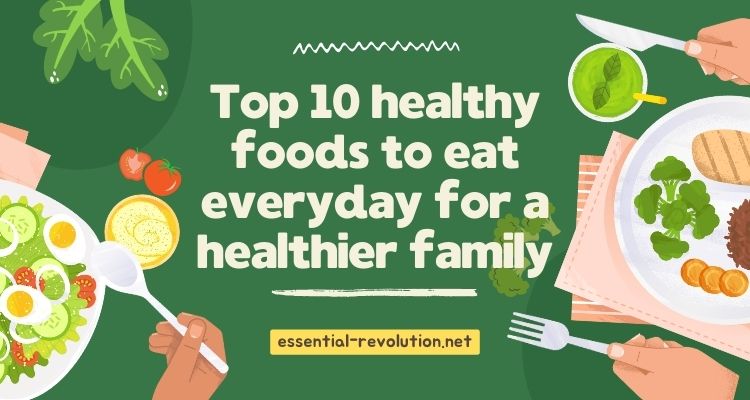Eating a balanced diet with healthy foods to eat everyday is crucial for maintaining good health and well-being for you and your family.
Maintaining a nutritious diet is essential for overall health, and incorporating healthy foods to eat everyday can significantly enhance the quality of life for you and your family. The following list of the top 10 healthy foods to eat everyday will help you achieve this goal, offering a variety of nutrients to support growth, energy, and disease prevention.
10 healthy foods to eat everyday
1. Leafy Greens
Leafy greens like spinach, kale, and Swiss chard are nutritional powerhouses, rich in vitamins A, C, and K, as well as iron, calcium, and antioxidants. These nutrients are crucial for maintaining healthy vision, strong bones, and a robust immune system. Including leafy greens in your diet can reduce the risk of chronic diseases such as heart disease and diabetes.
Benefits:
- Boosts immune system
- Supports bone health
- Reduces risk of chronic diseases
2. Berries
Berries, such as blueberries, strawberries, and raspberries, are packed with antioxidants, vitamins, and fiber. These fruits help reduce inflammation, improve heart health, and support brain function. Their high antioxidant content can protect your cells from damage as well as reduce the risk of various cancers.
Benefits:
- Anti-inflammatory properties
- Supports heart health
- Enhances brain function
3. Nuts and Seeds
Nuts and seeds, including almonds, walnuts, chia seeds, and flaxseeds, are excellent sources of healthy fats, protein, and fiber. Also, they provide essential nutrients like vitamin E, magnesium, and omega-3 fatty acids, which are vital for brain health, heart health, and maintaining healthy skin.
Benefits:
- Improves heart health
- Supports brain function
- Maintains healthy skin
4. Whole Grains
Whole grains like quinoa, brown rice, oats, and barley are rich in fiber, vitamins, and minerals. These nutrients help regulate blood sugar levels, reduce cholesterol, and promote a healthy digestive system. Consuming whole grains can also lower the risk of heart disease, stroke, and obesity.
Benefits:
- Regulates blood sugar levels
- Reduces cholesterol
- Promotes healthy digestion
5. Yogurt
Yogurt is a great source of probiotics, calcium, and protein. Probiotics are beneficial bacteria that support gut health, aiding digestion and boosting the immune system. Additionally, the calcium in yogurt helps maintain strong bones and teeth.
Benefits:
- Supports gut health
- Boosts immune system
- Strengthens bones and teeth
6. Fatty Fish
Fatty fish such as salmon, mackerel, and sardines are rich in omega-3 fatty acids, protein, and vitamin D. These nutrients are essential for heart health, brain function, and reducing inflammation. Regular consumption of fatty fish can lower the risk of heart disease, depression, as well as cognitive decline.
Benefits:
- Enhances heart health
- Supports brain function
- Reduces inflammation
7. Legumes
Legumes, including beans, lentils, and chickpeas, are excellent sources of plant-based protein, fiber, and essential nutrients like iron and folate. In addition, they can help lower cholesterol levels, regulate blood sugar, and support digestive health. Legumes are also beneficial for weight management due to their high fiber content.
Benefits:
- Lowers cholesterol
- Regulates blood sugar
- Supports digestive health
8. Avocados
Avocados are nutrient-dense fruits, high in healthy monounsaturated fats, fiber, and various vitamins and minerals such as potassium and vitamin E. These nutrients contribute to heart health, support healthy skin, as well as help in the absorption of fat-soluble vitamins from other foods.
Benefits:
- Supports heart health
- Promotes healthy skin
- Enhances nutrient absorption
9. Sweet Potatoes
Sweet potatoes are rich in beta-carotene, vitamin C, potassium, and fiber. These nutrients help boost the immune system, promote healthy skin, and support eye health. Sweet potatoes also have a low glycemic index, which helps regulate blood sugar levels.
Benefits:
- Boosts immune system
- Promotes healthy skin
- Supports eye health
10. Citrus Fruits
Citrus fruits like oranges, lemons, and grapefruits are high in vitamin C, fiber, and antioxidants. Vitamin C is essential for immune function, skin health, and the absorption of iron from plant-based foods. The antioxidants in citrus fruits also help protect the body from oxidative stress and inflammation.
Benefits:
- Enhances immune function
- Supports skin health
- Boosts iron absorption
Incorporating Healthy Foods into Your Daily Diet
To ensure that you and your family are consuming these healthy foods to eat everyday, consider the following tips:
- Meal Planning: Plan your meals around these nutrient-dense foods. For instance, include leafy greens in salads or smoothies, and add berries to your breakfast cereals or yogurt.
- Healthy Snacks: Keep nuts, seeds, and fruits readily available for quick and nutritious snacks.
- Balanced Diet: Aim to incorporate a variety of these foods in your daily diet to ensure a broad spectrum of nutrients.
- Cooking Methods: Opt for healthy cooking methods such as steaming, grilling, or baking to preserve the nutritional value of these foods.
- Family Involvement: Involve your family in meal planning and preparation to encourage healthy eating habits. This can be a fun and educational activity for children.
Final words about healthy foods to eat everyday
By including these top 10 healthy foods to eat everyday in your diet, you can significantly improve your family’s health and well-being. These foods provide essential nutrients that support various bodily functions, help prevent chronic diseases, and promote overall vitality. Making conscious choices to eat a balanced diet rich in these healthy foods can lead to a longer, healthier, and more fulfilling life for you and your loved ones.

